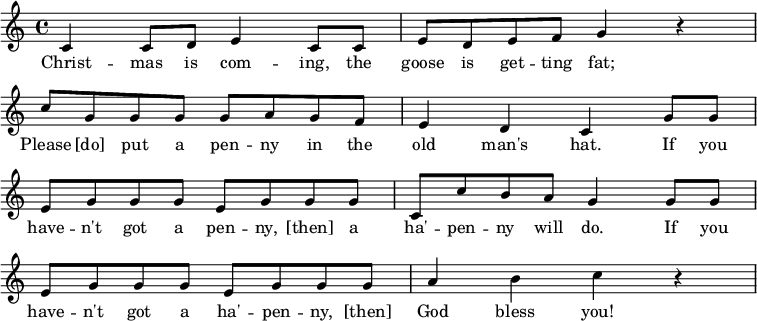This article needs additional citations for verification .(December 2017) |
"Christmas Is Coming" is a traditional nursery rhyme and Christmas song frequently sung as a round. It is listed as number 12817 in the Roud Folk Song Index.
This article needs additional citations for verification .(December 2017) |
"Christmas Is Coming" is a traditional nursery rhyme and Christmas song frequently sung as a round. It is listed as number 12817 in the Roud Folk Song Index.
The following are common representative lyrics:
- Christmas is coming, the goose is getting fat
- Please put a penny in the old man's hat
- If you haven't got a penny, a ha'penny will do
- If you haven't got a ha'penny, a farthing will do.
If you haven't got a farthing God bless you!
Although the lyrics begin appearing in print in 1885 [1] and 1886, [2] they are presented without an author and in a way of cataloging something that was already mostly common knowledge of the time. Some sources have variants of these lyrics and additional verses. [3] [4] [5]
The common melody paired with the lyrics is usually simply listed as a traditional English carol, while some sources curiously list the author Edith Nesbit Bland as its composer. [6] [7] [8]

Another common melody, usually listed as a traditional English carol, is differentiated by an arrangement of it made by Walford Davies, published in 1914. [9] The lyrics have also been paired with the melody of the English dance tune "Country Gardens". [4] [10]
A few field recordings were made of traditional versions of the song, [11] [12] [13] including one sung by Jack Elliot of Birtley, Durham to Reg Hall in the early 1960s, [14] which is archived within the British Library Sound Archive. [15]
The Kingston Trio recorded the song as "A Round About Christmas", on their 1960 album The Last Month of the Year . [6] [16] [17] A loose, jazzy piano-based arrangement was featured in Vince Guaraldi's musical score for the 1965 animated television special A Charlie Brown Christmas , [18] and a calypso-sounding version was featured in the 1979 special John Denver and the Muppets: A Christmas Together . [19]
The rhyme also became the basis for the 1953 song "Christmas Is a-Comin'", written by Frank Luther and recorded by Bing Crosby, among others. [20]